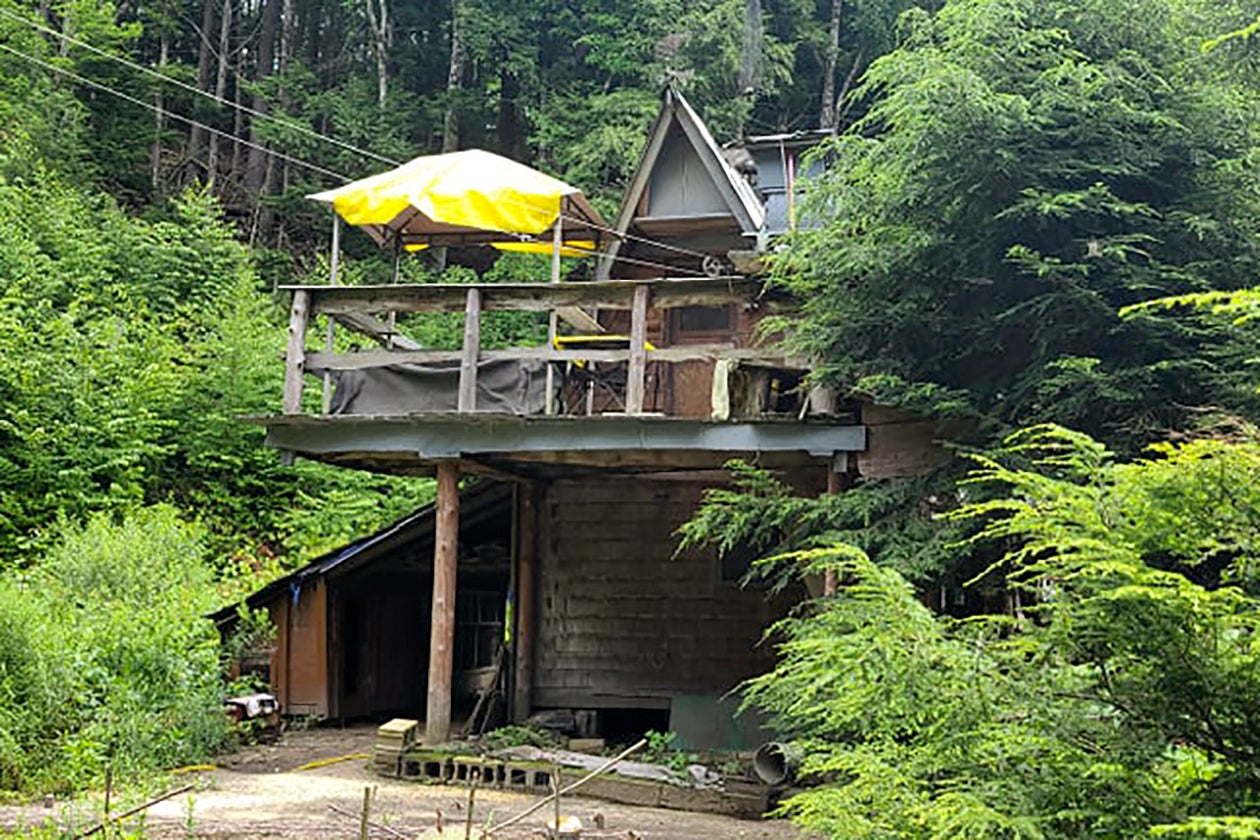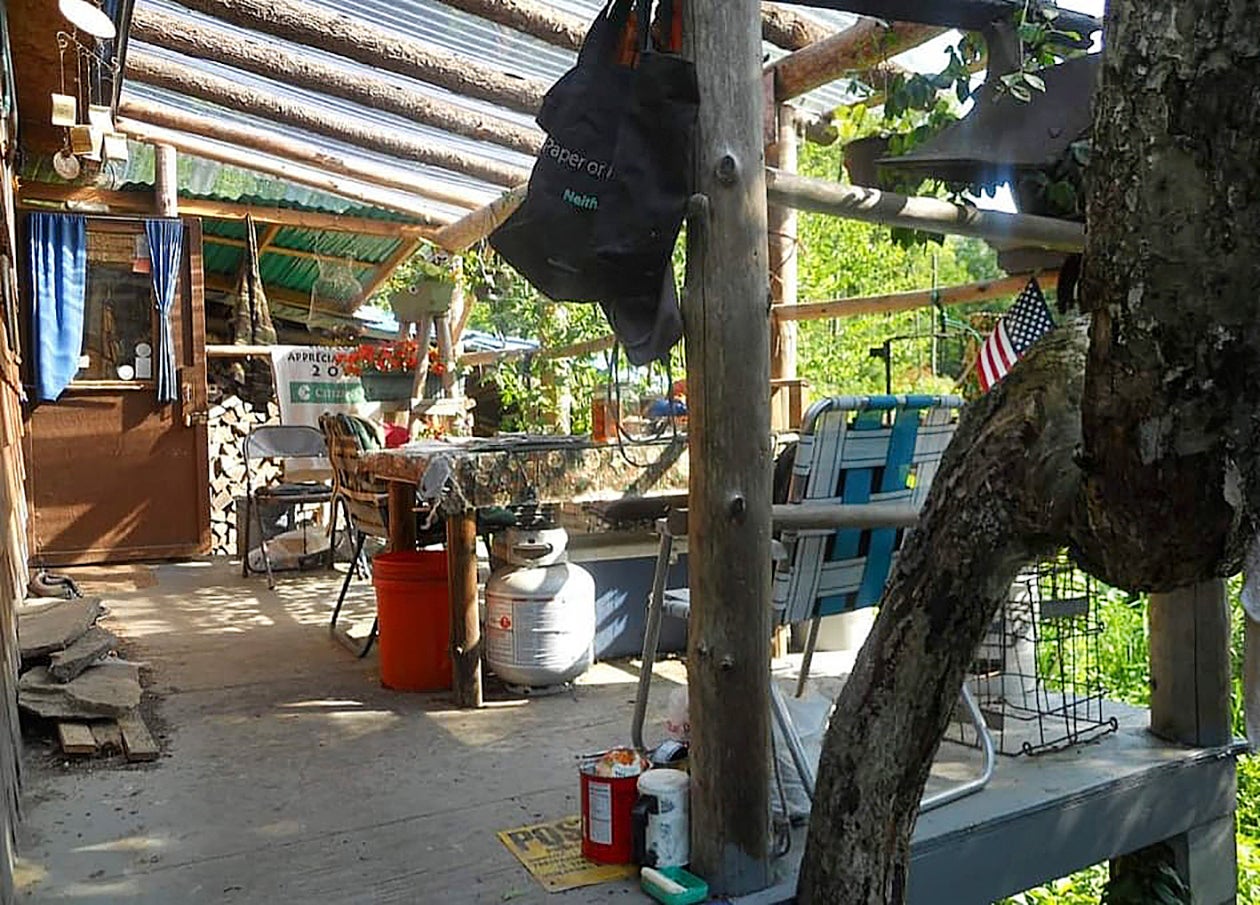Update: N.H. cabin that ‘River Dave’ has lived in for decades just burned to the ground
Category: Other
Via: buzz-of-the-orient • 4 years ago • 35 commentsBy: By KATHY McCORMACK, Associated Press


Update: N.H. cabin that ‘River Dave’ has lived in for decades just burned to the ground
David Lidstone is behind bars after being accused of squatting for 27 years on private property in Canterbury

David Lidstone. Jodie Gedeon via AP
CANTERBURY, N.H. (AP) — For almost three decades, 81-year-old David Lidstone has lived in the woods of New Hampshire along the Merrimack River in a small cabin adorned with solar panels. He has grown his own food, cut his own firewood, and tended to his pets and chickens.
But his off-the-grid existence has been challenged in court by a property owner who says he’s been squatting for all those years. And to make Lidstone’s matters worse, his cabin was burned to the ground Wednesday in a blaze that local authorities are investigating.
Lidstone, or “River Dave” as he’s known by boaters and kayakers, was jailed July 15 on a civil contempt sanction. He was told he’d be released if he agreed to leave the cabin, but he has stayed put.
In a court appearance Wednesday before news of the fire, Lidstone told a judge, “You came with your guns, you arrested me, brought me in here, you’ve got all my possessions. You keep ’em.
“I’ll sit here with your uniform on until I rot, sir.”
Lidstone is accused of squatting for 27 years on the private property in Canterbury. The owner of the land had been seeking to tear down the cabin before the fire.
Jodie Gedeon, an avid kayaker who befriended Lidstone about 20 years ago, had been working with other supporters to help him, including organizing a petition drive and collecting money to cover property taxes.
“I’m devastated,” she said when she learned about the fire.
“He’s just a really, really, big caring guy, and just chooses to live off the grid,” she said in an interview last week. “It really is about humanity, it really is about compassion, empathy … he’s not hurting anybody.”
In court, Merrimack County Superior Court Judge Andrew Schulman agreed that Lidstone wasn’t hurting anyone, but said the law was clearly on the landowner’s side.
“You’re doing your own thing in the ‘Live Free or Die’ state, so there’s a lot of sympathy to you for that,” he said. “But there’s a lot of weight on the other side of the balance sheet, and not just about what the (landowner) wants to do with the land, but the weight I feel to uphold the judgment of the court and the rule of law.”
Gedeon and other supporters came out to a town selectboard meeting on Monday. Board members had said the town currently has no standing in the property dispute.
But even if there were a way to allow Lidstone to stay, it would be an uphill battle. His home was in violation of local and state zoning and environmental regulations, and there was no access to a road.

Jodie Gedeon via AP
“You guys are in a quandary. So are we,” selectman Robert Steenson said.
The woodlot Lidstone called home was just a few miles away from Interstate 93. But it was hidden by the trees; it’s on 73 acres that’s been used for timber harvests. The property has been owned by the same family since 1963. There are no plans at this time to develop it.
Lidstone has claimed that years ago, the owner gave his word — but nothing in writing — allowing him to live there. But in the eyes of the current owner, he’s a squatter and needs to go.

Jodie Gedeon via AP
Property owner Leonard Giles, 86, of South Burlington, Vermont, didn’t even know Lidstone was there until the town administrator found out in 2015 and told him, expressing concern “with regard to the solid and septic waste disposal and the potential zoning violations created by the structure,” according to Giles’ complaint in 2016.
The judge suggested Wednesday that Giles and town officials work with a mediator, but Giles’ lawyer said the logistics would be too daunting.
The vast bulk of Lidstone’s personal items had been removed from the cabin, Giles’ attorney Lisa Snow Wade said Wednesday night. The status of his animals wasn’t immediately known. She said the property also had chicken coops, a greenhouse and a woodshed; it wasn’t immediately known if those structures were still standing.

David Lidstone. – Jodie Gedeon via AP
Lidstone, who doesn’t have an attorney, insisted that his cabin is a hunting and fishing camp, not a home. He also argued that Giles doesn’t own the property but is being pressured by the town.
“He’s a heck of a nice old man, I’ve talked with him a couple of times. This is not his fault, this is not my fault,” he said at the hearing. “It’s lying, cheating corrupt judges like you that are stepping on little people like me. But I’m telling you, sir, you step on me, I’m going to bite your ankle.”
Lidstone, a bearded, small-framed, spritely man, has resisted efforts to leave since a judge issued an order for him to vacate in 2017. Following that, both sides had attempted to reach some sort of agreement for him, but were unsuccessful, according to court documents.
Before the fire, Lidstone could be released if one of three things happened: he agreed to leave, the cabin was demolished by Giles, or 30 days had passed since he was jailed. Another hearing was scheduled for next week, but Lidstone’s status wasn’t immediately clear.
He hasn’t had any other contact with law enforcement, unlike the case of a man in Maine called the ” North Pond Hermit,” who also lived in the woods for nearly three decades and pleaded guilty in 2013 to multiple burglary and theft charges.
Over the years, Lidstone, a U.S. Air Force veteran and a father of four who has made money as a woodsman, has been known to invite kayakers and boaters into his home, sharing stories about his life in the wild.
The wooden, two-level A-frame cabin was profiled by a local television show in 2018. There was a small, cluttered kitchen with pots hanging from the ceiling, some appliances, and curtains on the windows. His porch had a footstool with a base made of stacked beer cans. He converted a wood stove into a beehive. He attached lights, a mirror and a pulley for a clothesline to logs supporting the cabin. There were piles of firewood.
Nearby was a gravel path leading to vegetable garden plots outlined by logs and some berry bushes. Lidstone got his water from a stream.
Lidstone’s decision to live in the woods is “exactly the lifestyle he wants,” said his brother, Vincent Lidstone, 77, of Lafayette, Georgia.
“What they’re doing to him isn’t right for anybody, whether he’s my brother or anybody’s brother,” he said. “He’s 81 years old. Leave him alone.”
Vincent Lidstone said he lost touch with his brother through the years, but described how the two of them and a cousin enjoyed spending time outdoors. They grew up in Wilton, Maine.
“We lived in the woods,” he said. “We camped, fishing, hunting. The three of us did everything together for a lot of years.”
It’s unclear where Lidstone would go. Vincent Lidstone said he doesn’t have the resources to help him. The Associated Press reached two of his three sons, who said they haven’t been in touch with their father recently. His daughter didn’t respond to a message seeking comment.
Before the fire, Gedeon had said the matter hasn’t been discussed by her group yet.
“We want to see him be able to live out his remaining years where he is,” she said.
Associated Press writer Holly Ramer contributed to this report.
Tags
Who is online
32 visitors

Don't we have one or two "Hermits" on NT? I'd like to hear from them about this.
I'm not a hermit, but it's too bad that something couldn't be worked out for him to live out the rest of his life in his ''home''.
I did like his comment to the judge, ''I'll bite your ankle'' LOL, love it, never back down.
Old people, lol. "Get off of my lawn" !
If it was burned down, kinda makes it mute I would think.
At his age and life expectancy it will be a little hard to start over, even if a gofundme were to be done to get him a little piece of land and a cabin.
It just seems suspicious that it would catch fire while he was in jail.
Sad that he has no where to go. Someone has to have a fishing camp or something to let him stay in.
The cause of the fire was my first thought when I saw that as well - wish it could be proven that the landowner did it.
I believe it was his own doing. It states he had installed solar panels to live off the grid, which means he was charging batteries with them. Since he was in jail he wasn't maintaining the batteries or even draining them through usage. Overcharging, overheating, shorting out, and then fire. The batteries are usually stored in the house/cabin.
I never realized that using solar panels could be so dangerous.
Lead acid batteries produce Oxygen and Hydrogen while charging (especially in the event of overcharging). These gases are produced by the electrolysis of water from the solution of water and sulfuric acid. If the batteries were indoors the cabin would fill up with hydrogen gas which is explosive and an overcharging overheated battery can explode too which would ignite the built up hydrogen in the cabin. In Cars we use a voltage regulator to prevent overcharging but they go bad and the overcharging can kill the battery but the hydrogen doesn't usually build up because the car is running and moving.
Seems there was an article on NT about fire departments needing special training to handle fires caused by or involving solar panels. As long as the panel is exposed to sunlight they will constantly push DC voltage and there was no way of controlling the voltage push like you can with AC in case of a short or overload. And I doubt that David Lipstone even thought about that.
It was about electric cars with lithium ion batteries that go thermal.
Before that, it could've even been NV, but the same situation of a loaded DC system that needs to be controlled.
In some states if an area of land is used/occupied and maintained for a certain period of time it becomes the property of the occupier. I'm not referring to squatters.
Exactly, that was my thought too. In New Hampshire, the adverse possession laws apply for squatters who have lived on the same land continuously for at least 20 years.
There must be some condition that he did not meet.
If, as Lidstone stated, the prior owner gave permission, his occupation of the property might not be considered "adverse", and thus, adverse possession would not apply.
Also, and I'm just guessing about New Hampshire law, if the landowner took legal efforts to evict him within a certain period of time (maybe before 20 years has passed), that might defeat adverse possession.
Most states have statutes regarding adverse possession, and make it a requirement that the adverse possessor pay taxes on the property. New Hampshire does not have an adverse possesion statute and, apparently, there is no requirement to pay taxes on the property.
So what are the legal implications if the owner did give permission? If so then he has the right to stay since he is not a squatter. If, however, the owner deems him a squatter then adverse possession seems to apply. The loophole, I suppose, is that the owner could claim that she gave him permission originally but then rescinded it less than 20 years ago. That seems like a difficult thing to defend given how long he was on her property.
The article also states that there are legal issues with the house itself. But why is he in jail? On what grounds? The article says 'civil contempt'. More to the story?
Interesting.
If the owner gives permission, the occupation of the property, by definition, is not adverse. If the owner rescinds permission, then continued occupation of the property would be adverse. According to the factual account in the report, permission was granted by the prior owner. It's unclear how long the current owner has been the owner, or how long the possession under that owner may have been considered adverse. Given that there was an eviction order in 2017, it may well be that there were not 20 years of "adverse" possession by Lidstone.
Lidstone's failure to comply with the 2017 order to vacate could be the basis for the civil contempt ruling. Again, it's just speculation because we do not have the complete factual record.
Maybe because he said this to the judge...
The article does say that he disobeyed a court order to vacate.
From a different article I read the current land owner inherited the land from his father and it was suggested the town council that was pushing everyone in the case because the land was being used for timber cutting and this guy's "cabin" was in the way. They were using the zoning ordinance and the fact he didn't have a proper sewage tank or access road. The judge said he had no leniency in this when he passed his original order to vacate.
I think a big problem is the way the law works is the owner gets fined for all the violations on the property and the occupant is considered a tenant, the only redress for the owner is to evict him.
Years ago I heard something about, if someone put up a fence and the fence stayed there for so many years the property would become theirs.
That is the adverse possession law. It is more complicated than that, but in principle you are correct. And it varies per state.
That's correct.
My first class in first year of law school (44 years ago this month!!!) was property law, and the first topic we studied was adverse possession. That was a real eye opener.
My nephew just passed (rock star level) the Bar exam a few months back. He is the one who told me of adverse possession. What a surprising law ... and to be so common.
Congratulations to your nephew. When I took the bar exam only 50% of us passed. As difficult as law school can be, practicing law is far more demanding. I just work part-time now moving towards full retirement... and happily so.
I think it was about 50% for his group too.
Thankfully I retired from law about 20 years ago. I think if I had continued the practice I wouldn't have made it to my present age.
The bar exam is not easy. Neither is being a lawyer.
I probably should have retired already, but I keep getting referrals, even from clients I represented 25-30 years ago.
I believe you.
There is also adverse possession law in Canada, and I would assume in every British Commonwealth country.
The doctrine of adverse possession has antecedents that trace back centuries into British common law. In fact, the earliest manifestion of the doctrine may date back to about 2,000 B.C., in the Code of Hammurabi, which granted ownership to an adverse possessor after three years.
They should have just let him stay, he wasn't hurting anything and keeping him in jail cost taxpayers money and is just mean
Unfortunately.....
But he has had offers from people in Maine, New Hampshire and California for a place to go.